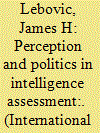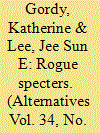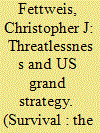| Srl | Item |
| 1 |
ID:
166698


|
|
|
|
|
| Summary/Abstract |
This paper looks at the question of development by focusing on both Cuba and the Democratic People’s Republic of Korea. At the heart of the project is the notion of sustainability, and how to achieve well-being even in the most challenging conditions, isolated economies and sanction-laden realities. This is done by tracing both countries’ engagement and development in the fields of health and education. We suggest that political engagement with these countries should be prioritised, without challenging an established political order but with its consent, and with the hope that future generations are socialised to a culture of openness.
|
|
|
|
|
|
|
|
|
|
|
|
|
|
|
|
| 2 |
ID:
092391


|
|
|
|
|
| Publication |
2009.
|
| Summary/Abstract |
United States estimates of Soviet nuclear goals and capabilities and the current "rogue-state" nuclear threat reflected prevailing beliefs about threat within the U.S. government and the relative influence of agencies charged with threat assessment. This article establishes that the patterns in formal Soviet threat assessment: (i) did not reflect a uniform response to "external threat," (ii) were inevitably tied to underlying assumptions about adversary intent, and (iii) were susceptible then to perceptual, organizational, and/or political influences within government. Thus, threat assessments reflected the optimism and pessimism-and political interests and ideologies-of those who participated in the estimating process. The article concludes by examining these lessons in light of the experiences and challenges of assessing threat from small states harboring nuclear ambitions.
|
|
|
|
|
|
|
|
|
|
|
|
|
|
|
|
| 3 |
ID:
100142


|
|
|
| 4 |
ID:
066291


|
|
|
| 5 |
ID:
092088


|
|
|
|
|
| Publication |
2009.
|
| Summary/Abstract |
The United States continues to label North Korea and Cuba "rogue states" of unique international distinction even though their economic, political, and military power has declined steadily since 1990. The authors argue that persistence of the label and accompanying US behavior is best understood by expanding upon a Schmittian frame of analysis to demonstrate that the designation of rogue state determines the normative weight given to certain behaviors, rather than the other way around. Examining the distinctive mode of politics practiced by North Korea and Cuba shows that they do pose threats to the United States, but not in the ways traditionally recognized by liberal states. Rather, through the anomalous role they play in the US-led system, their relentlessly polemical political discourse, and their excitable speech and ideological unmasking, they highlight the primacy of the political dimension determining their relationship with the United States and the contradictions underlying the universalism of US hegemony.
|
|
|
|
|
|
|
|
|
|
|
|
|
|
|
|
| 6 |
ID:
071653


|
|
|
|
|
| Publication |
2006.
|
| Summary/Abstract |
This essay addresses a prominent post-Cold War issue to which political scientists have paid relatively little attention: the status of so-called rogue states in international politics. The war in Iraq crystallized transatlantic disagreement over whether "rogue states" exist and how they should be treated, but the debate raged throughout the 1990s. This essay brings international relations theory to bear on the issue of "rogue states," but it does so with a theoretical twist. It argues that we must first identify the entity from which these states are allegedly excluded as well as who gets to set the membership criteria. If we stipulate that the international system includes all states, then international society can be defined according to various shared ideas and many realizations of international society are possible. Powerful states may try to act as "norm entrepreneurs," promoting their ideas as the basis of international society. But states, including great powers, may genuinely disagree over the basis and boundaries of this society. It is thus vital not only to take both power and shared ideas seriously, but also to describe the origins and limits of shared ideas. The limits to shared ideas can be termed "bounded intersubjectivity." This essay uses the debate over "rogue states" and the transatlantic crisis over confronting Iraq to underscore these theoretical issues
|
|
|
|
|
|
|
|
|
|
|
|
|
|
|
|
| 7 |
ID:
138598


|
|
|
|
|
| Summary/Abstract |
As the Soviet Union was in the process of collapsing, Georgi Arbatov sent a letter to the New York Times that contained a warning for the United States. Arbatov, who was one of the Kremlin’s leading ‘Amerikanists’, wrote that the Soviets were unleashing a ‘secret weapon’, one ‘that will work almost regardless of the American response’. It was not the stuff of Cold War
nightmares, some sort of last-minute deus ex machina from the Academy of Sciences that would rescue the Soviet Union from oblivion. No, in this instance, the weapon was psychological and unequivocal: the Kremlin was about to deprive America of the Enemy.
|
|
|
|
|
|
|
|
|
|
|
|
|
|
|
|